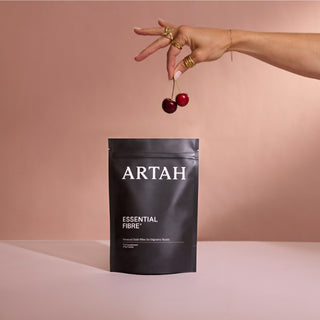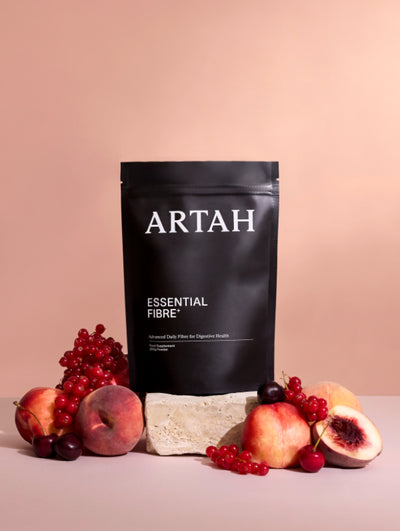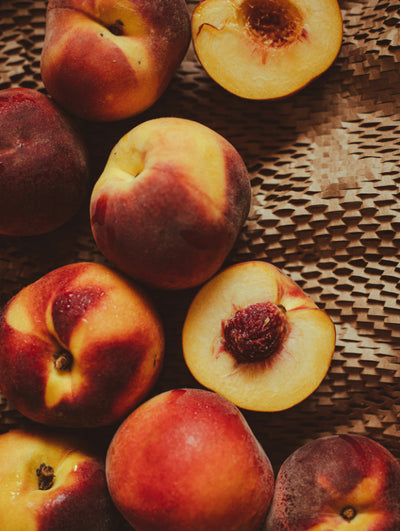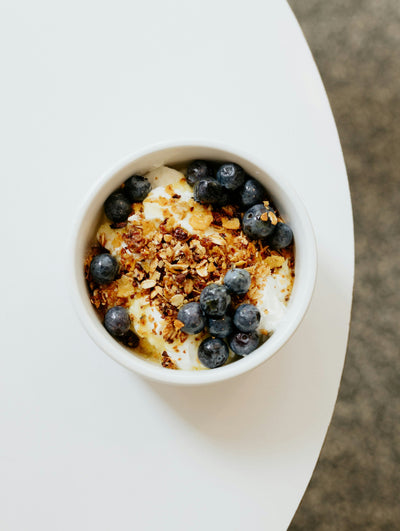The Happy Gut
If your gut is happy, you’d give yourself good marks for digestion, elimination, AND overall wellbeing. You generally don’t have any gut related symptoms unless there’s an obvious cause – like a 9 course tasing menu with wine pairings, or a long haul flight with too much plane food. If this is you, it’s all about optimization. If you’re not already doing so, try to make sure you’re scoring over 30 on the plant diversity scale and aim for regular intake of fermented foods to help keep your microbes in balance. If you want to give your microbiome some extra love, make sure you over index on polyphenol rich herbs and spices, especially coming into winter. Foods like ginger, turmeric, horseradish (fresh, not creamed), rosemary, thyme, fennel, parsley, cinnamon and cumin can help nourish the microbiome and come with added beneficial properties for immunity and metabolism.
The Angry Gut
If you’re currently in the throes of an uncomfortable and erratic gut, reducing irritation, promoting microbial balance, and restoring function will be your priorities. When it comes to foods, finding your food triggers is a must. Whilst you may not need to avoid these foods longterm, they are probably contributing to your symptoms in the here and now. We love The 28-Day Reset for an easy-to-follow modified elimination protocol that will help you calm the gut and identify triggers, but, if you don’t have a clear runway to try this over the summer, there is still a lot you can do.
- Reduce snacking: this will help support your gut’s natural cleaning mechanism, the migrating motor complex, and allow them to rest and recover between meals.
- Extend your overnight fast: if you’re not getting 12 hours between your dinner and first meal of the next day (including a milky tea or coffee), then this is your goal. Once you have this down, try extending it to 14 hours, a few days per week, to see how your gut responds.
- Try to avoid artificial sweeteners: sorbitol, xylitol, and maltitol are notorious for causing uncomfortable gut symptoms, so do a scan of your cupboard to see if they’re lurking in any of your regular foods. You’ll find these in a lot of sugar free foods, including keto-snacks and protein powders.
- Reduce lactose: a common trigger for gut symptoms. If you can’t imagine a summer without cheese, don’t fret – there are still a lot of options. Goats' gouda, Havarti, Manchego, aged parmigiano, aged pecorino, edam, and fontina are all naturally low in lactose.
- Support your gut: with The Gut Recovery Set, featuring GI Cleanse, for microbial balance, Biome Restore, for targeted probiotic support, and Deep Detox to support detoxification and elimination.
- Be mindful of alcohol: alcohol is a gastric irritant, a disruptor of the microbiome, and can promote intestinal inflammation, (1) so consider giving your gut a few weeks (or months) with no alcohol to help get things under control.
The Inconsistent Gut
If you’re somewhere in the middle, it’s still important to add in proactive steps to support your gut health before it swings in the wrong direction. But, you can be a little gentler in your approach. Try to keep a log of the inconsistencies and how they may relate to food, alcohol or stress. Sometimes this is enough to find out if there’s a simple food or lifestyle trigger that throws off your system. Introducing functional foods into your regime can also help; start with 3 servings of wild fermented food each week and build from there. Up your plant diversity from the good gut list below, reduce the consumption of artificial sweeteners, and try to cut out any ultra-processed foods that feature as a dietary staple. To add supplemental support for digestion and microbial balance, try Enhanced Synbiotic, which features digestive enzymes, probiotics, and polyphenols from cranberry and pomegranate.
The Sneaky Gut
The sneaky gut is more common than you’d think. If this is your gut type, you’d likely rate your digestion and bowel movements as normal or even good, but you’ll have a host of other systemic issues that you can’t seem to put your finger on. Think skin issues, poor immunity, poor appetite control and more. You may also have a history of regular antibiotic use or multiple bouts of food poisoning/ stomach bugs (one of the leading causes of long-term gut issues). If this resonates, it’s all about microbial balance. An imbalance in the good and bad bacteria in the gut can cause many systemic issues that may seem unrelated to the gut, and the worse our microbial diversity, the worse our overall health. Start with 3 months of GI Cleanse and Biome Restore, designed to support the microbiome and combat harmful bacteria. When it comes to foods, focusing on diversity, ferments, herbs, spices, and whole foods; here’s our list of good gut foods to help you on your way.
Good Gut Foods
It takes about 30 different plant varieties consumed regularly to ensure our good bacteria are getting what they need, so focusing on a plant-forward diet is key. This number includes fruit, vegetables, whole grains and pseudograins, herbs, spices, nuts, seeds, lentils and beans, so it’s easier than you think to hit your goal. Here are some of our – and our microbiome's – favourites.
Prebiotic foods – prebiotic fibre nourishes the microbiome and acts as their fuel, helping with diversity and overall microbial health. Some of the best of the best include chicory, Jerusalem artichokes, garlic, onion, leek, shallots, spring onion, asparagus, beetroot, fennel bulb, green peas, snow peas, cabbage, chickpeas, lentils, red kidney beans, apples, nectarines, peaches, watermelon, grapefruit, pomegranate, oats, and cashews. Resistant starch (RS) is also a great prebiotic. This type of starch is fermentable by our microbes, and formed when certain starchy foods are cooked and cooled overnight – think oats, rice, potatoes, buckwheat and more. Cooking isn’t the only way to help RS content. Some foods are better eaten raw: one cup of cooked oats contains about 0.5g of resistant starch whereas ¼ cup of raw oats has a whopping 4.4g, making overnight oats a great swap for gut health this summer.
Fermented foods – live fermented foods contain beneficial bacteria and their metabolites, which can help our own microbial populations. Our favourites are natural yogurt, kefir, tempeh, wild pickles, kimchi, miso, natto, brined natural green olives, and sauerkraut. Look for ‘live’ on the label, or if the food has been pasteurized, look for varieties that state live colonies have been added back in.
Functional foods/herbs – these plants, herbs, and roots have beneficial compounds that promote bacterial health either by supporting the growth of good colonies, combatting overgrowth of bad colonies or reducing irritation. The best of the best include triphala, licorice root (DGL), slippery elm, marshmallow root, turmeric, black clove, green tea, cardamom, oregano, ginger, green banana flour. Colourful fruit and vegetables rich in flavonoids are also big players when it comes to the microbiome, so aim to include berries, peppers, red cabbage and dark leafy greens.

Disclaimer: The information is presented in this article is for educational purposes only and is not intended to diagnose, prevent, or treat any medical or psychological conditions. The information is not intended as medical advice, nor should it replace the advice from a doctor or qualified healthcare professional. Please do not stop, adjust, or modify your dose of any prescribed medications without the direct supervision of your healthcare practitioner.


















































